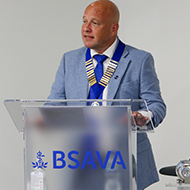‘Smuggled’ pregnant mare gives birth after being rescued
The mare and foal have been named after the founder of World Horse Welfare.
The last of five pregnant mares rescued after they were discovered by authorities in Dover, Kent, has given birth to a healthy foal.
The mare was one of 26 horses and ponies, dubbed the Dover 26, who were abandoned at a holding yard. It is believed that the horses were being smuggled and may have ended up in a European slaughterhouse.
Only 19 of the animals had the necessary paperwork and many of them had health issues which made them unfit to travel. One of them was in such a poor state it had to be euthanised.
Since the rescue, the animals have been looked after by the charity World Horse Welfare at Hall Farm Rescue and Rehoming Centre in Snetterton, Norfolk. The mare has been named Ada and the filly foal Cole, after Ada Cole, the founder of World Horse Welfare.
The charity has created a #StopHorseSmuggling pledge for supporters to sign to urge decision makers to crack down on the illegal trade.
Megan Jarvis, a groom at Hall Farm looking after Ada and Cole, said: “These two are the lucky ones as they have a bright future ahead of them and once Cole has been weaned our charity will ensure they are found loving new homes.
“I can’t bear to think about all the other horses that aren’t as lucky as them and having to go on even longer journeys in worse conditions. I, for one, will be signing the pledge and hope that others will join me in doing the same.”
Although the Dover 26 were rescued, nobody has faced legal action over the incident.
Kim Ayling, senior public affairs officer at World Horse Welfare, said: “Unfortunately due to the lack of information to be able to properly trace the background of the Dover 26 movements before being discovered, it has made a possible prosecution quite challenging.
“We have approached all of the local authorities who could have taken legal action and none of them have wanted to take that forward.”
The charity’s pledge can be signed here.
Image © Shutterstock



 Julian Hoad has been confirmed as the new president of the British Small Animal Veterinary Association (BSAVA), taking over from Carl Gorman.
Julian Hoad has been confirmed as the new president of the British Small Animal Veterinary Association (BSAVA), taking over from Carl Gorman.